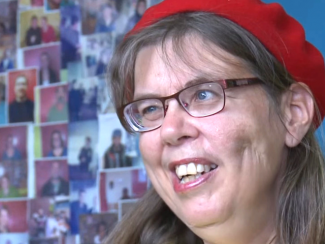A POOR CHOICE
Action group challenges policies that push people into poverty

Amy Moonshadow, chairwoman of the Community Advocate Network, says the provincial Liberal government needs to ensure basic food security for its poorest citizens
POVERTY IS POLITICAL. Successful action to end poverty must begin with that hard truth says the brand new Nova Scotia Action Coalition for Community Wellbeing (NSACCW).
The coalition rejects the idea that poverty is inevitable—a result of human weakness or lack of ambition. Instead, it points the finger firmly at politicians and successive governments for creating and following policies that make poverty inevitable.
The action coalition of 19 advocacy groups, social work associations, and other campaign organizations plans to push hard for policy change: away from the so-called “trickle down” economic policies pursued by the provincial Liberal government.
The action coalition says government policies of explicit austerity measures, combined with deliberate decisions not to act to improve or even maintain social programs, have combined to push more and more Nova Scotians into poverty.
“It is clear we must make different political choices,” said Alec Stratford, director of the Nova Scotia College of Social Workers, at the news conference to launch the new action coalition. “We must start to frame our political choices and our political goals to enhance our common wellbeing and not just economic growth.”
“In Nova Scotia the situation keeps getting worse. It’s the only province to see child poverty levels grow, as wages remain stagnant.”
‘We want to live like humans’
Amy Moonshadow, chairwoman of the coalition member Community Advocate Network, explained that many people with disabilities in Nova Scotia are forced to live on just $821 per month. After rent is paid, this leaves no money for basic necessities, like decent food. “We are looking for more than adequacy,” she added. “We want to live like humans.”
JoAnna LaTulippe-Rochon, executive director of the Cape Breton Family Place Resource Centre, explained that wages are so low that even some two-parent families with two full-time jobs can’t meet the basic necessities of life. “It’s not about poor decision-making. It’s basic math: if it takes $1,000 to get everything paid and you only have $800, you cannot come up with the other $200 on your own,” she said.
How bad is it?
Child poverty in Nova Scotia is higher than ever. It has shot up 20% since our Canadian parliament unanimously voted thirty years ago to end all child poverty everywhere in Canada.
Roughly one in five children in Nova Scotia live in poverty. In some parts of the province it is far worse: close to 25% in the Annapolis Valley; around 30 percent in the region of Sydney-Victoria on Cape Breton Island.
Mere statistics can’t tell the full story of the hardships these families face. Lesley Frank, a sociology professor who researches child poverty at Acadia University, explained last year that some families fall more than $9,000 below the poverty line, or more than $800 per month. A shortfall that extreme doesn’t just mean missing out on a meal now and again. It means having no access to basic necessities. It means missing out on life.
Frank stressed that federal programs like child benefit are insufficient. “Things didn’t improve much at the beginning of the child benefit system,” Frank told CBC.
Changing the system
The action coalition also stresses the importance of combatting the attitudinal, social, economic and environmental barriers that maintain systemic poverty.
Some of the coalition’s key goals include:
- safe, secure, accessible and affordable housing for all
- access to safe, nutritious, affordable, and culturally appropriate food
- access to free public education
- a dignified livable income for all.
In addition to political advocacy, the coalition aims to engage with communities and individuals to provide public education about social justice issues and how to pursue equality.
The coalition’s member organizations include the Women’s Centre Connect, the Canadian Centre for Policy Alternatives, Nova Scotia College of Social Workers, and the Community Advocate Network, an anti-poverty campaign group.
- 30 -












Add new comment